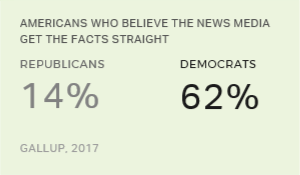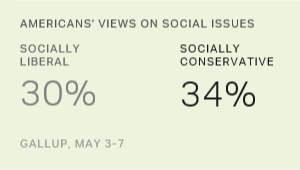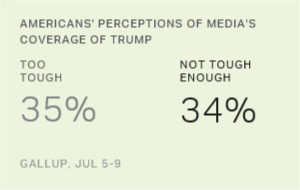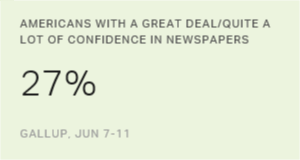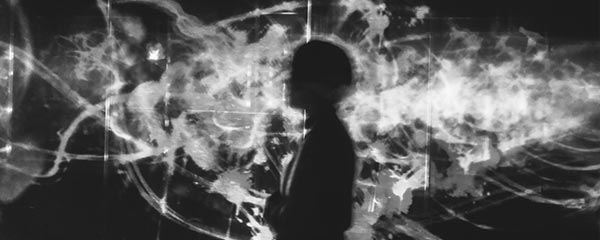Story Highlights
- 14% of Republicans believe news media get the facts straight
- 62% of Democrats agree
- College-educated are most likely to find news media credible
WASHINGTON, D.C. -- Just over a third of Americans (37%) in 2017 say news organizations generally get the facts straight, unchanged from the last time Gallup asked this question in 2003. But despite the apparent stability in U.S. adults' perceptions of news media accuracy, major partisan shifts in beliefs on this topic have emerged over the past 14 years. Republicans' trust in the media's accuracy has fallen considerably, while Democrats' opinions on the matter have swung in the opposite direction.
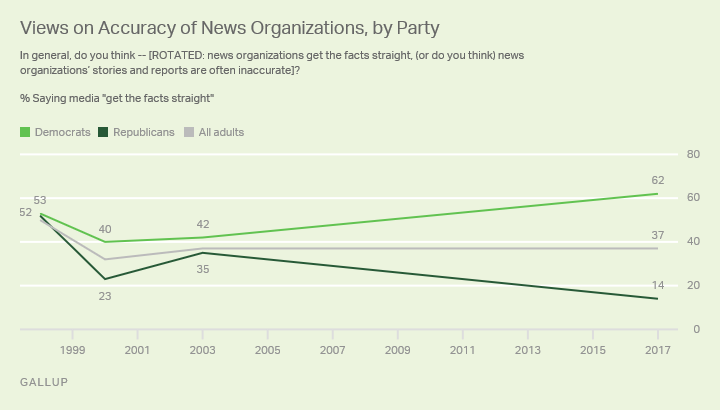
The most recent findings come from two Gallup polls, conducted in March and July of this year and consisting of interviews with 1,810 adult Americans.
When Gallup first asked this question in 1998, over half of both Republicans (52%) and Democrats (53%) believed news organizations generally got the facts straight. Both groups' belief in the accuracy of the media fell in late 2000, likely in response to mistaken election-night projections of the 2000 presidential election, which saw some networks first declare Democrat Al Gore and then Republican George W. Bush the winner, before ending the night with no official winner.
Though the networks later admitted to jumping the gun on the Gore and the Bush projections, Republicans' trust in news organizations fell far more sharply than Democrats'. In December 2000, 23% of Republicans said news organizations generally get the facts straight -- a 29-percentage-point decline -- compared with 40% of Democrats. While Democrats' perceptions did not change much in 2003, Republicans' views improved somewhat.
This year, only 14% of Republicans believe the news media get the facts straight, down 21 points from 2003. This seems at least partly attributable to President Donald Trump's frequent invective toward the media. But last year, before Trump became president, a separate measure showed a general loss of trust in the U.S. news media among Republicans over the previous 15 years, suggesting that Trump may be taking advantage of shifting GOP attitudes at least as much as creating them.
Before last year's election, Democrats' trust in the mass news media, more generally, had declined over the previous 15 years, even though Democratic trust has always exceeded Republican trust. Thus, Democrats' 21-point increase since 2003 in belief in the media's accuracy may be a recent counterreaction to Trump's criticism of mainstream media, reflecting a renewed appreciation for the press. Although Gallup has yet to update Americans' overall trust in mass media since Trump took office, it did find in June that the percentage of Democrats who have "a great deal" or "quite a lot" of confidence in newspapers nearly doubled from the year before, rising from 28% to 46%.
College-Educated Americans More Likely to See News Media as Accurate
Though political affiliation exerts the greatest influence on a person's beliefs about the accuracy of media, education is also important. College graduates are much more likely than those without a college degree to believe news organizations generally get the facts straight when reporting the news.
In 2017, 49% of college graduates say the news media generally get the facts straight, compared with 36% of Americans who attended college but did not graduate and 28% of those with no more than a high school education. These effects are most pronounced among Democrats but are also apparent among independents.
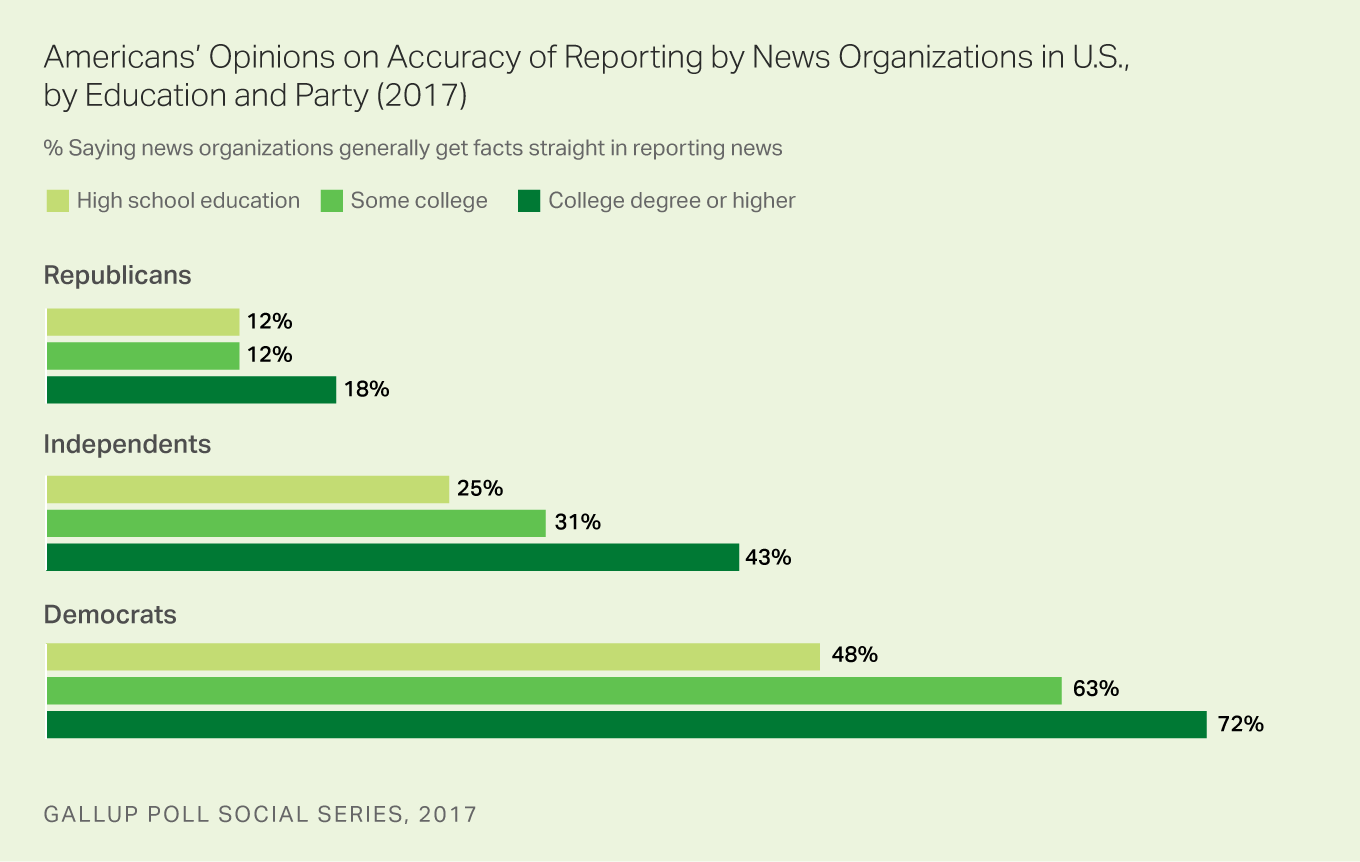
Nearly three-fourths of Democrats (72%) with a college degree say news organizations are generally accurate, slightly more than the 63% of Democrats who attended but did not graduate college and well above the 48% of Democrats without any college education who say the same.
Independents follow a similar pattern -- those with a college education are more likely than those without a college degree to say news organizations generally get the facts straight.
However, education appears to make little difference in Republicans' beliefs about the credibility of news media. Even among Republicans with at least a college degree, 18% say the media get the facts straight -- only slightly higher than the 12% of Republicans without a college degree who say the same.
Democrats, College-Educated Have Highest Confidence in Newspapers
In June, Gallup asked Americans about their confidence in a variety of institutions, including three news media outlets -- newspapers, TV news and internet news. Democrats and college-educated adults' confidence in the various news media is distinct from other Americans' views in one notable way -- both are significantly more likely than others to have confidence in newspapers than in TV news or internet news.
For example, 46% of Democrats say they have "a great deal" or "quite a lot" of confidence in newspapers; slightly fewer (38%) have this level of confidence in TV news and only 18% have similar faith in internet news.
By contrast, Republicans are about equally as likely to say they have a great deal or quite a lot of confidence in newspapers, TV news and internet news -- at 13%, 13% and 14%, respectively.
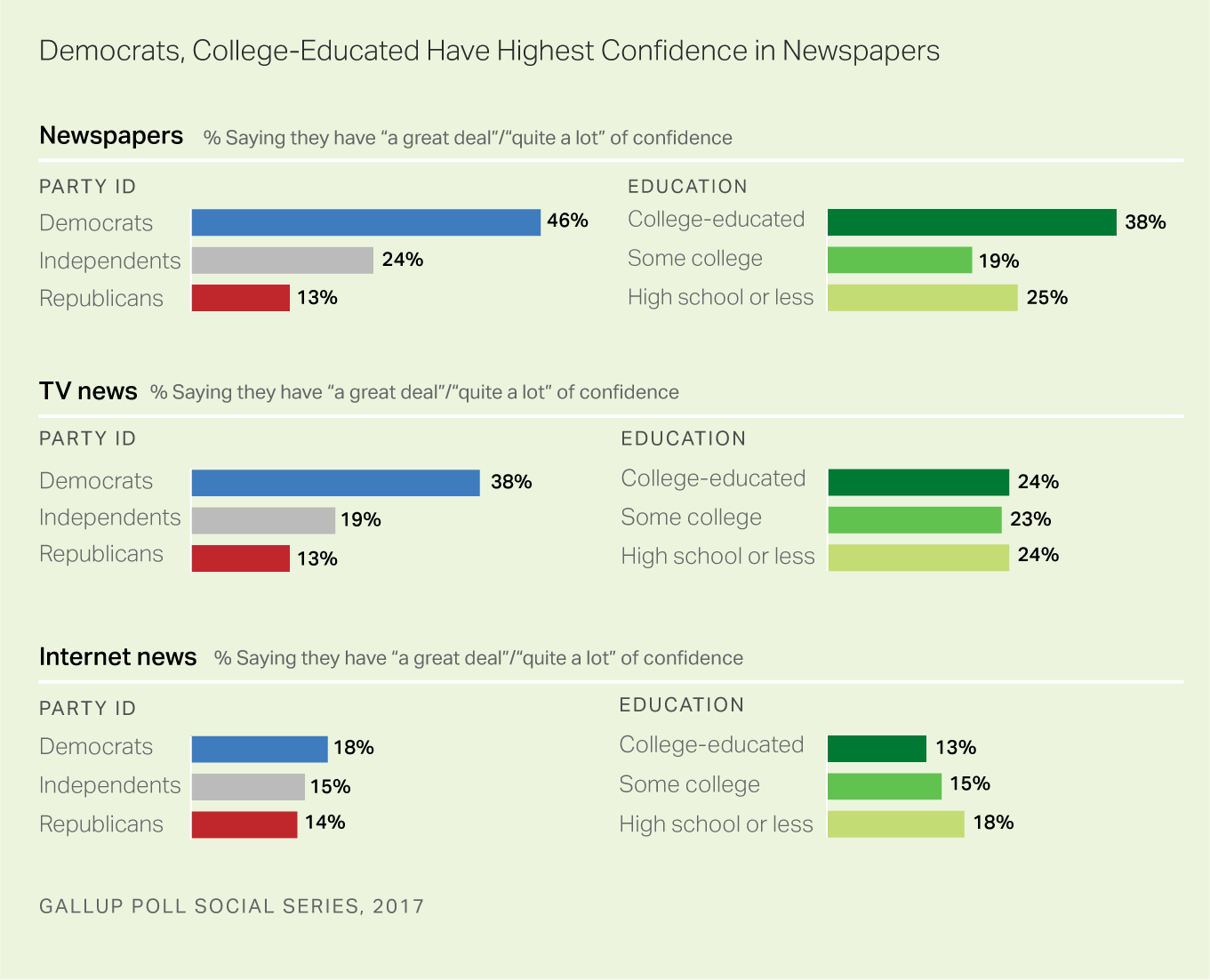
Likewise, college-educated Americans are nearly twice as likely to have confidence in newspapers as they are to have confidence in TV news and nearly three times as likely to have confidence in newspapers as in internet news. Americans with lower levels of education have similar levels of confidence in each of the three news media.
Bottom Line
More than at any time in recent memory, the credibility of the major U.S. news organizations has come under persistent assault, particularly from Trump, who has made such critiques a major part of his tweets and a focus in many of his speeches. This negative positioning of the news media comes at a time when Republicans and Democrats have vastly different perceptions of the media's accuracy -- with Republicans now overwhelmingly seeing the news media as inaccurate and a majority of Democrats believing the opposite.
This partisan gap has not always been evident. In the late 1990s and early 2000s, the two partisan groups' views of news media accuracy were much more convergent, although differences did appear after the 2000 election.
More broadly, the finding that a solid majority of the country believes major news organizations routinely produce false information is one with potentially significant consequences. As one example, these views may be related to Americans' diminished trust in most major U.S. institutions and rising cynicism about the U.S. political system and elected officials.

Gallup Analytics
Subscribe to our online platform and access nearly a century of primary data.
Survey Methods
Results for this Gallup poll are based on telephone interviews conducted March 9-29 and July 5-9, 2017, with a random sample of 1,810 adults, aged 18 and older, living in all 50 U.S. states and the District of Columbia. For results based on the total sample of national adults, the margin of sampling error is ±3 percentage points at the 95% confidence level. All reported margins of sampling error include computed design effects for weighting.
For March/July results based on the sample of 472 Republicans, the margin of sampling error is ±6 percentage points at the 95% confidence level. For results based on the sample of 773 independents, the margin of sampling error is ±4 percentage points at the 95% confidence level. For results based on 518 Democrats, the margin of sampling error is ±5 percentage points at the 95% confidence level.
Results for the question on confidence in types of media are based on telephone interviews conducted June 7-11, 2017, with a random sample of 1,009 adults, aged 18 and older, living in all 50 U.S. states and the District of Columbia. For results based on this sample, the margin of sampling error is ±4 percentage points at the 95% confidence level.
For June results based on the sample of 286 Republicans, the margin of sampling error is ±7 percentage points at the 95% confidence level. For results based on the sample of 413 independents, the margin of sampling error is ±6 percentage points at the 95% confidence level. For results based on the sample of 296 Democrats, the margin of sampling error is ±7 percentage points at the 95% confidence level.
Each sample of national adults includes a minimum quota of 70% cellphone respondents and 30% landline respondents, with additional minimum quotas by time zone within region. Landline and cellular telephone numbers are selected using random-digit-dial methods.
View survey methodology, complete question responses and trends.
Learn more about how the Gallup Poll Social Series works.
